In addition to Weibo, there is also WeChat
Please pay attention

WeChat public account
AutoBeta


2024-11-17 Update From: AutoBeta autobeta NAV: AutoBeta > News >
Share
AutoBeta(AutoBeta.net)08/19 Report--
The lane-changing transformation from traditional fuel vehicles to new energy vehicles has increasingly become the future development trend of the automobile industry, and the suspension of the sale of fuel vehicles and comprehensive electrification is almost the consensus of the global automobile industry. However, although many well-known car companies generally believe that pure electric power will be the mainstream of the automobile industry in the future, Toyota, which has always advocated gas-electric hybrids and hydrogen fuel cell vehicles, does not seem to be optimistic about the future development of pure electric vehicles.
Jack Hollis, executive vice president of Toyota's North American sales, believes there are still obstacles to the promotion of all-electric vehicles, saying: "although you may want to talk about electric cars, the market is not mature enough," the Wall Street Journal reported. According to the report, Jack Hollis pointed out in an interview on Thursday local time that consumers may not switch from traditional fuel vehicles to pure electric vehicles as quickly as some automakers expected, and for many consumers, hybrid models may be a better solution in the near future, so Toyota plans to continue to focus on hybrids and plug-in hybrids in the near future, as these models are more attractive to the mass market.
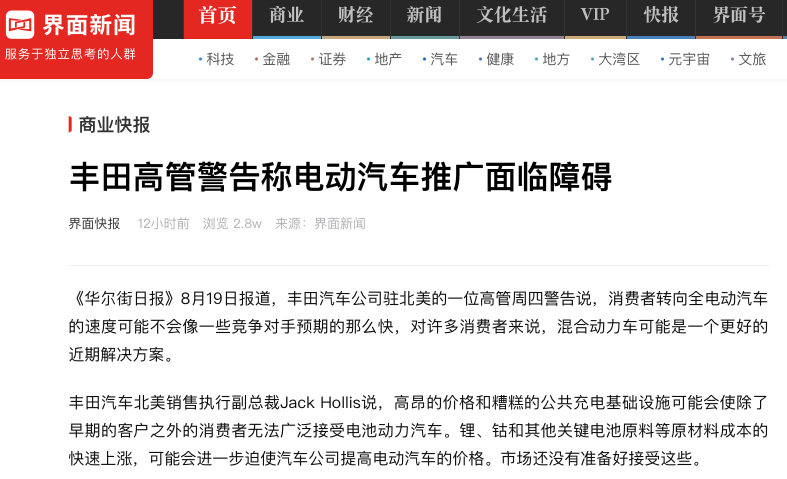
In sharp contrast to Jack Hollis's point of view, Tesla CEO Musk publicly declared: "Hybrid cars are only a short stage of automobile development, and now is the time to give up hybrid cars." As soon as this view was published, it also caused strong controversy on the Internet.
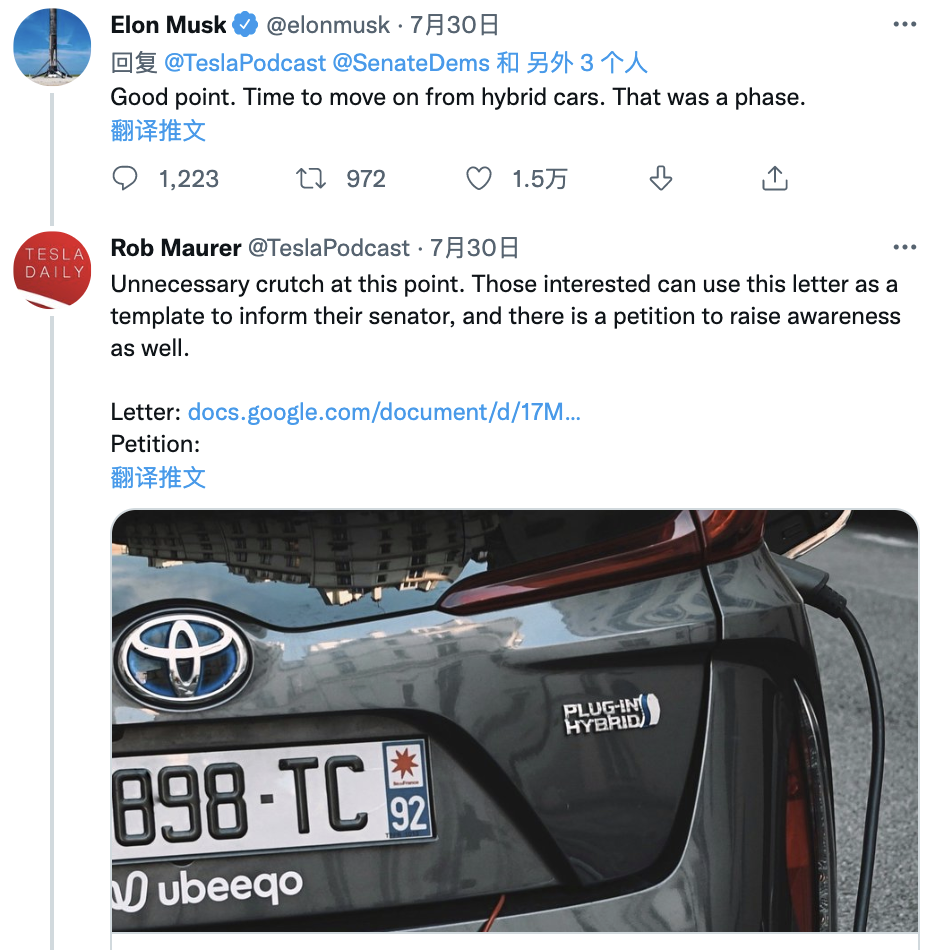
As we all know, before December last year, Toyota CEO Akio Toyoda was once regarded as a staunch opponent of pure electric cars, almost completely uninterested in electric cars, and when talking about new energy strategies in public. Toyota also usually puts hybrid cars, pure electric cars and fuel cell cars on the same plane, indicating that Toyota has more than pure trams in its new energy strategy. Akio Toyoda even "bombarded" pure electric vehicles many times, believing that electric vehicles are suspected of being over-hyped. In his view, "pure electric is not the only way out for the automobile industry". As long as it can save energy and reduce emissions, mixing should also be advocated. It is not wise to promote pure electric vehicles blindly and ban models using internal combustion engines, including gas-electric hybrids. On the contrary, he encourages diversified solutions. Such as advocating gas-electric hybrid cars and hydrogen fuel cell vehicles, rather than just encouraging pure electric vehicles.
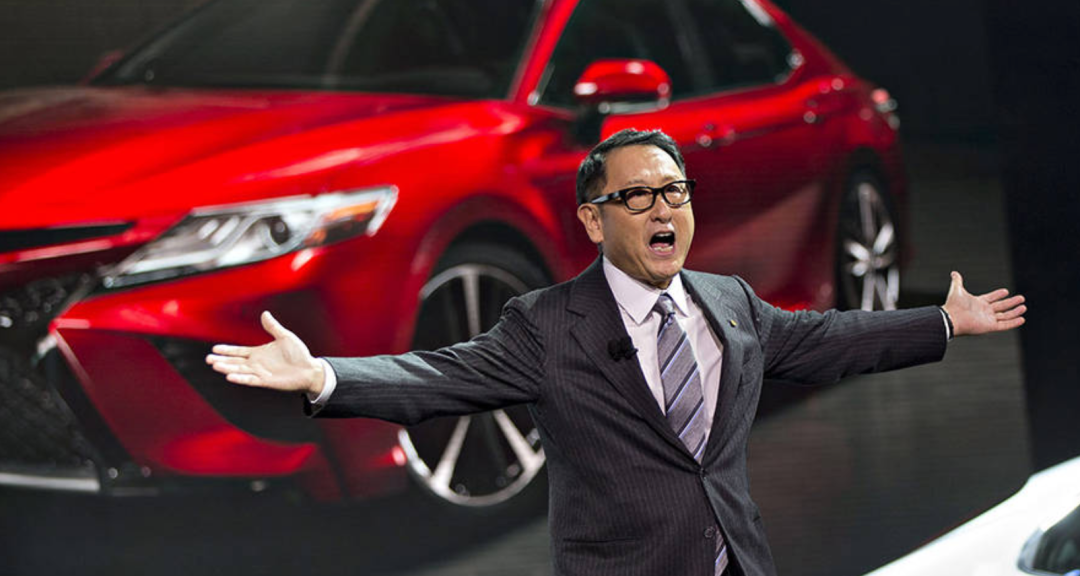
Until December 14 last year, Akio Toyoda personally launched 15 electric cars and announced a 10-year plan for electric vehicles, a move that instantly caused a sensation in the auto industry. Toyota has no choice in an environment where electrification has become a major trend of automobile development, so it has launched a large number of electric cars to keep abreast of the trend of the times. Toyota is scheduled to invest $35 billion in electric vehicle research by 2030, after launching 30 electric vehicles worldwide and selling 3.5 million vehicles. Among them, in the Chinese market, Toyota and Lexus will introduce 35 new electric products in 2025, including 10 pure electric models, and by 2035 Lexus will only sell electric vehicles, that is, fully transformed into pure electric brands.
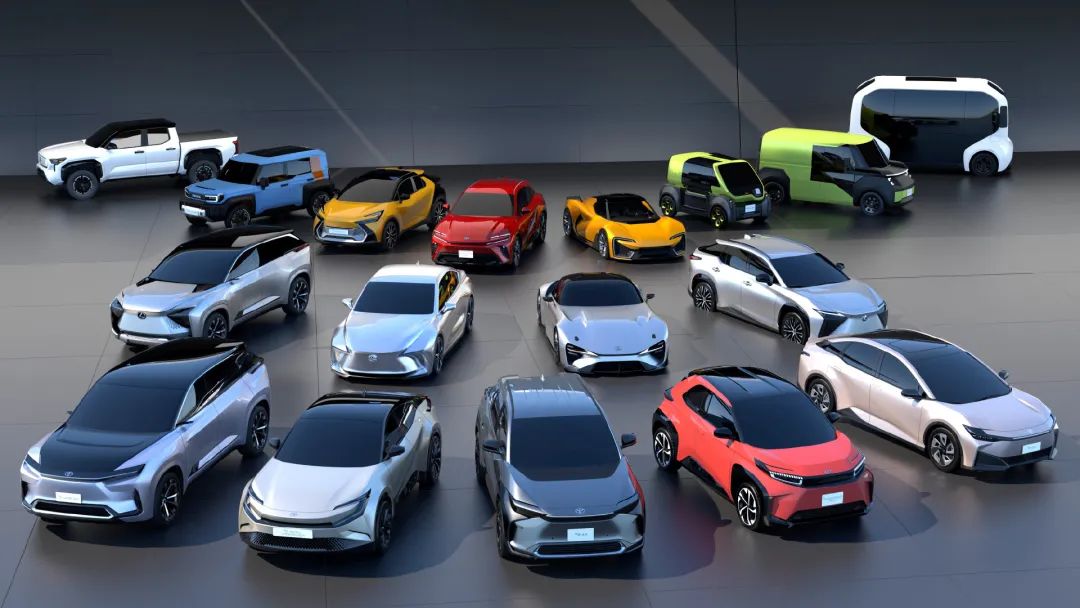
Although Toyota has made a new electrification strategy, compared with other car companies, Toyota's promotion in the field of electrification is not radical, or even one of the most conservative. At the same time, in the electrified transformation, Toyota's start is not smooth. On April 12, Toyota released the price and configuration of its 2023 bZ4X pure electric SUV in the United States and Japan, but in just two months, Toyota suspended sales of the car and announced an emergency recall worldwide. According to the official statement, the reason for the recall is: "Toyota bZ4X in sharp turns and emergency brakes, hub bolts may be loose, if you continue to drive in this state, there will be abnormal noise." The worst-case scenario is that the tire may fall off. Therefore, you'd better not drive this car now. " In order to recall as soon as possible, Toyota even offered an unconditional full refund.
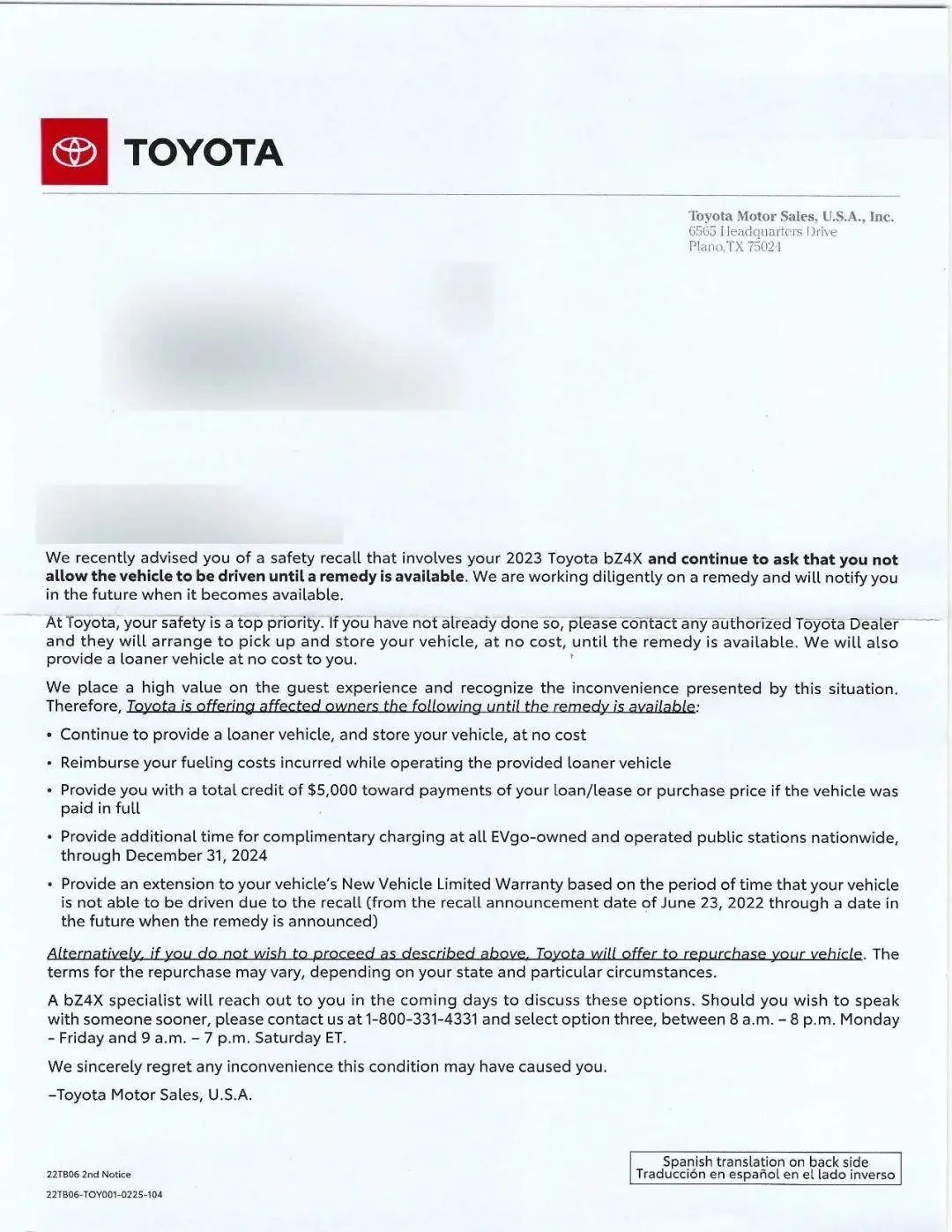
Toyota bZ4X, the world's first all-electric SUV model, went on sale in China as early as April 28. The car was scheduled to go on sale on June 17, but just two hours before the price announcement, the brand suddenly announced the suspension of the launch. Toyota explained: "the supply chain is uncertain and a more consumer-friendly price is being set to ensure the interests of users and delay the price release." On the same day, Yuan Qicong, an auto media man, said on the social platform: "in a recent test, Toyota found that the battery management system of the bz4X could go wrong in a cold environment, resulting in a failure to recharge. The source said that this may be due to the design of the power supply temperature control mechanism, because the heating power is not enough to meet the working temperature requirements of the battery in the cold environment, resulting in failure. If the news is true, it is a design error and a low-level mistake. However, as the battery suppliers of the Chinese version are different from the overseas version, it is not known whether the defect is a special case of the Chinese version or an overall design error. Toyota's Chinese version of bz4X will not be available until this defect is resolved. Toyota China said on June 23 that "the tire rim bolts may be loose during intense bZ4X control, and in serious cases there may be a risk of tire falling off, because bZ4X has not yet been produced or sold in Chinese mainland area, so this recall does not involve the Chinese market, but is mainly aimed at the United States, Europe, Japan and other regions."
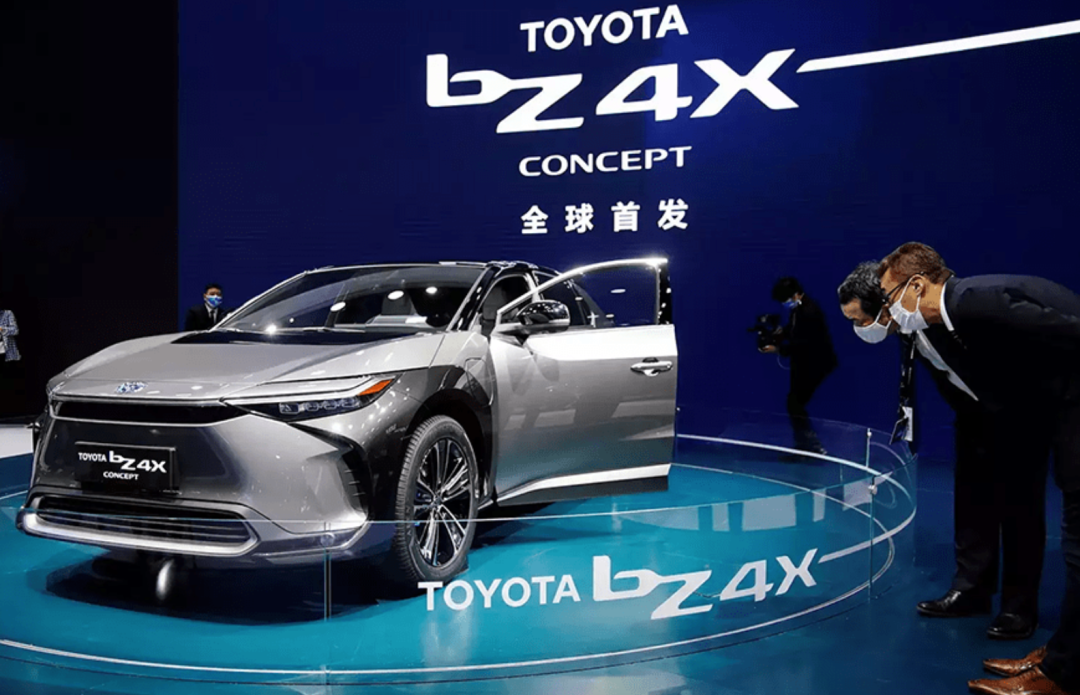
Hybrid models are regarded as transitional products from fuel vehicles to pure electric vehicles. From the current domestic market, the domestic passenger car market demand is showing a trend of differentiation, that is, the proportion of traditional fuel vehicles continues to decline, while the proportion of new energy vehicles continues to increase. According to statistics, the total number of domestic new energy passenger vehicles in 2021 increased by 181.0% to 3.312 million, and retail sales increased by 169.1% to 2.989 million. In 2021, the wholesale total of domestic fuel vehicles fell 4 per cent to 17.79 million, and retail sales fell 6 per cent to 17.16 million. According to the latest data, from January to July this year, the wholesale number of domestic new energy passenger vehicles increased by 123% to 3.03 million vehicles, and the retail volume increased by 121.5% to 2.733 million vehicles. Up to now, a number of car companies around the world have set a specific time to stop selling fuel vehicles, including BYD in March 2022; BAIC, Changan and Nissan will stop selling fuel vehicles in 2025; Mercedes-Benz and BMW will stop selling fuel vehicles in 2030; Volkswagen will stop selling fuel vehicles in the European market in 2035; Honda will stop selling fuel vehicles in 2040 Kia will stop selling fuel vehicles in the EU market in 2035; in addition, General Motors, Ford, Jaguar and Volvo have announced that they will stop selling fuel vehicles in the future. At the national level, Norway will ban the sale of conventional fuel vehicles in 2025; the Netherlands, California, Germany and India will ban the sale of conventional fuel vehicles in 2030; France and the United Kingdom will ban the sale of traditional fuel vehicles in 2040, of which the UK will stop selling not only fuel vehicles, but also gas-electric hybrid cars.
Of course, there is some truth in Toyota's argument that the car itself is a complex industrial product with a long R & D cycle and life cycle, so the full transition to an all-electric car cannot be achieved overnight, as Toyota Jack Hollis pointed out: "High prices and poor public charging infrastructure may make battery-powered cars impossible for consumers other than early customers." The rapidly rising cost of raw materials such as lithium, cobalt and other key battery materials could further force car companies to raise the price of electric vehicles. The market is not ready for this. " However, the automobile industry is concerned that as "electrification" has gradually become an industry trend, it is only a long time for diesel locomotives, including hybrid locomotives, to be fully electrified. For automobile companies, the transformation from traditional fuel vehicles to new energy vehicles is both a challenge and an opportunity, while for consumers, traditional fuel vehicles will still occupy a dominant position, and users can continue to buy fuel models. Because it will take a decade or even decades to complete the transition from traditional fuel vehicles to new energy models.
Welcome to subscribe to the WeChat public account "Automotive Industry Focus" to get the first-hand insider information on the automotive industry and talk about things in the automotive circle. Welcome to break the news! WeChat ID autoWechat
Views: 0
*The comments in the above article only represent the author's personal views and do not represent the views and positions of this website. If you have more insights, please feel free to contribute and share.





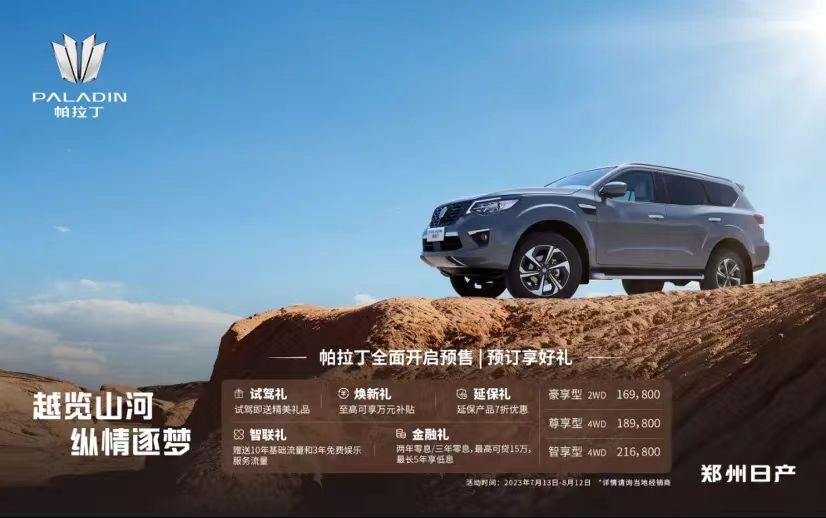





© 2024 AutoBeta.Net Tiger Media Company. All rights reserved.